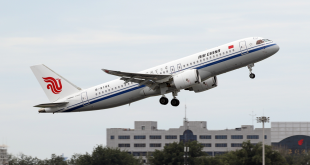Published: July 27,2023
By Azhar Azam

Kenyan President William Ruto meets with Wang Yi, director of the Office of the Foreign Affairs Commission of the Communist Party of China Central Committee in Nairobi, Kenya, July 22, 2023. /Xinhua
In a meeting with China’s Director of the Office of the Central Commission for Foreign Affairs Wang Yi, Kenyan President William Ruto lauded the smooth progress in the bilateral relationship since the establishment of diplomatic ties 60 years ago and expressed his commitment to deepen the comprehensive strategic partnership with China.
Ruto expressed his interest in strengthening cooperation in the areas of railway, highway, water conservancy, aviation, and renewable energy under the frameworks of the Belt and Road Initiative (BRI) and the Forum of the China-Africa Cooperation. He also wanted to work with Beijing on infrastructure, information and communication technology, education, and security and sought Chinese investment to spur economic growth and create jobs under his ambitious Bottom-Up Economic Transformation Agenda.
According to the Kenyan National Bureau of Statistics, Kenya’s total exports to China in 2022 increased 25.9 percent to $202 million, highlighting Beijing’s importance as a key export market for Nairobi. With a considerable decline in freight costs, bilateral trade is poised to witness further growth, extending significant relief to Kenyan importers and exporters.
China has been a major source of infrastructure development in the country. In Mombasa, Beijing is financing the construction of a new terminal in East Africa’s largest port. China has also loaned $5 billion in total for the construction of the country’s strategic infrastructure project, a train line that connects Mombasa with Nairobi, since its independence in 1973.
Since the launch of the BRI, China has delivered several infrastructure projects such as the Mombasa-Nairobi standard gauge railway, Nairobi Expressway, Global Trade Center, and the Mombasa Oil Terminal. These projects align with the Kenyan Vision 2030 and demonstrate China’s pivotal role in the country’s economic transformation and social development.
A China-built standard gauge railway begins running in Nairobi, Kenya, October 16, 2019. /CFP
Compared to other countries’ initiatives that consume years in finalizing negotiations, Beijing’s quick decision-making and implementation of the projects as well as competitive bidding, cheap labor and “mutually beneficial” partnership, has been the defining factor behind the Kenyan fondness toward China and recent drive to attract the Chinese investment.
Amid efforts to stoke panic and mistrust between Beijing and Nairobi through accusations of hacking on China, the Kenyan Interior Principal Secretary Raymond Omollo fought back in the most categorical terms. He described the accusations as “sponsored propaganda,” saying the allegations were not subjected to authoritative proof of existence by the relevant officials from both Kenya and China.
“The wide circulation and the alacrity for its attribution by other foreign media with well-known inclinations further hint at a choreographed and concerted attack against Kenya’s sovereignty,” he added, which indicated that such attempts are part of a larger plan to undermine the deployment of Chinese technology and Kenya’s digital transformation journey.
Characterized as the “African Silicon Savannah,” Konza Technopolis is a 5,000-acre technology hub being developed by Nairobi, which is expected to expand its nascent information-enabled services sector such as data centers. After launching a solution to cut electricity costs for industries, particularly manufacturers, by 10 percent to make them more competitive, the Chinese tech is now further enhancing Kenya’s youth digital skills to create a pool of trained professionals.
Further, as per Kenya’s Quarterly Economic Review (January-March 2023), imports from China accounted for only 17 percent of Kenya’s total imports and debt owed to Beijing amounted to just 17.2 percent of the total external debt. The latter data urged the studies to label debt-trap claims largely a “misinterpretation.” The Kenyan officials have repeatedly denied such allegations. Most recently, the country’s permanent representative to the United Nations, Martin Kimani, dubbed it as an effort “to find a way to minimize the partnership between China and different African countries.”
The financing of the Mombasa-Nairobi standard gauge railway, also known as Madaraka Express, makes up a major fraction ($5.3 billion) of Kenya’s debt to China. Yet the fact must not be discounted: Nairobi believes the project is critical to its national development program, the Vision 2030, and the country’s ambitions of industrialization and socio-economic development.
Over the last six years, the project has revolutionized the Kenyan transportation sector by providing greater convenience and comfort to millions and reducing the travelling time by almost a half. A high occupancy rate of more than 99 percent is bringing more revenues to the Kenyan treasury, urging its operators to add more coaches to meet the increasing demand.
Closing the infrastructure gap is vital for Kenya’s and African economic development and prosperity. Beijing, through infrastructure development and investments, is doing what Nairobi and the continent seeks to navigate the challenges as well as promote trade, end poverty and create job opportunities. This cooperation between the world’s second-largest and East Africa’s biggest economies should be welcomed and supported over its tendency to cater the development requirements of the most impoverished continent around the globe.
Mr. Azhar Azam, is a special commentator for CGTN, works in a private organization as a market and business analyst and writes on geopolitical issues and regional conflicts
cgtn.com
 Africa -China Review Africa -China Cooperation and Transformation
Africa -China Review Africa -China Cooperation and Transformation
